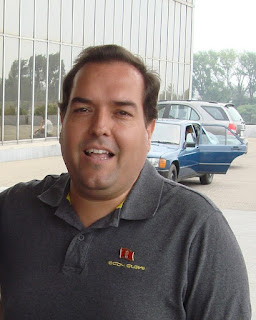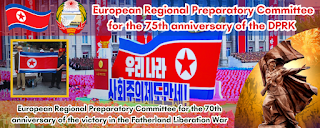Achievements of the DPRK in the field of education-contribution of Li Jizheng, of International Solidarity Group with the DPRK
The Workers' Party
of Korea and the government of the DPRK attach great importance to the
formation of socialist construction. In order to support socialist economic
construction, they are constantly reforming the education system and education
systems to develop various talents needed for socialist construction, which is
conducive to the development of socialist construction in South Korea.
The DPRK regards
education as one of the fundamental issues, from achieving the success of the
revolution and the future destiny of the nation. No matter what era or what
nationality, without education, it will not be able to achieve progress and
national prosperity. The issue of education was raised as a more important
issue in the newly independent countries, freed from imperialist colonial
enslavement. Before the liberation, Korea was a Japanese colony, and education
was very backward. In order to support spiritual slaves and stifle Korean
national culture, the Japanese colonialists tried their best to promote the
education of enslavement. In August 1945, Korea was liberated . At that time, there were only 1,000 elementary schools, 43
junior high schools, three technical high schools, and six teachers' colleges
in the northern part of the Korean peninsula. There was no high school and
university. The only university - Keijo Imperial University is located in the
southern part of the Korean peninsula, in Seoul. There were very few Korean
intellectuals and teachers. 65% of school-age children cannot attend school,
and over 80% of the population is illiteracy.
After Korea's
liberation began, the Provisional Government of North Korea promoted the
enslavement of the political Japanese colonial entity, introduced a patriotic
democratic line of education, and carried out a series of traditional education
reforms while actively pursuing a military movement to eradicate illiteracy. In
December 1946, the Provisional People's Committee of North Korea promulgated
the "Regulations on the education system of educational institutions of
North Korea", which the Korean people develop, for the first time in the
history of their education, created a complete education system from elementary
school to university. In September 1949, the Fourth Supreme People's Assembly
of the Democratic People's Republic of Korea promulgated the "Decree on
the universal introduction of the system of primary compulsory education."
According to this decree, from September 1, 1950, compulsory primary education
will be fully introduced in all regions of North Korea (due to the outbreak of
the Korean War, it was not introduced on time). As of September 1949, there
were 3,882 elementary schools, 926 junior high schools, 170 junior high
schools, 17 junior technical schools, and 55 secondary technical schools in the
northern part of the Korean Peninsula. 15 universities have also been
established. By March 1949, illiteracy was virtually eliminated from the
northern part of the Korean peninsula.
During the Fatherland
Liberation War, the Workers' Party of Korea and the government of the DPRK
restructured the work of teaching in scientific institutions under difficult
conditions in order to adapt the teaching work to the wartime system. On the
one hand, the government has widely adopted the educational form of training
courses, and on the other hand, invited the people of the whole country to
participate in the war to repair the bombed schools, so that students who have
lost their technological institutions can continue to receive education, at the
same time also sent a large number of students studying in China, the Soviet
Union and Eastern Europe to prepare for the post-war reconstruction of the
national economy and the needs of socialist construction.
After the
armistice, the national economy of North Korea is in dire need of a large
number of scientific talents for reconstruction and construction. Comrade Kim Il Sung put
forward the "basic direction in the work of education" in his report
at the Central Plenum of the Workers' Party of Korea in August 1953, calling
for concentration of efforts on strengthening higher and technical education,
as well as on training a large number of ethnic cadres. To this end, the Workers'
Party of Korea recommended to the Supreme People's Assembly that in 1955 the
Decree on Strengthening Technical Education be adopted. According to this
decree, many secondary schools were transformed into technical schools. In
April 1956, the Workers' Party of Korea held its third congress. At this
congress, the task was put forward to continue the promotion of the socialist
revolution within the five-year plan, to carry out agricultural cooperation and
the socialist transformation of private industry and trade. Comrade Kim Il Sung noted
in his report: “At present, 1,942,000 students are studying in the educational
institutions of the Republic. Now 4,800 students are studying at various
universities and technical colleges in the Soviet Union, the People's Republic
of China and other people's democracies. After the war, there were more than
37,000 students in the Republic who graduated from secondary schools and
various technical schools, and 6,200 students graduated from universities.
Primary universal compulsory education was introduced in 1956, secondary
universal compulsory education was introduced in November 1958, and free
universal compulsory education was introduced in April 1959. As of the end of
the five-year plan, North Korea had 2.5 million students in more than 8,000
educational institutions, the number of universities increased to 78, and the
number of students reached more than 97,000. There are 133,000 engineers,
specialists and technicians working in various sectors of the national economy.
In November 1966, the sixth plenary session of the Third Supreme People's
Assembly of North Korea passed a decree establishing nine years of universal
compulsory education from April 1967. The number of universities has increased
from 78 to 129, and 376 new secondary technical schools have been built. In
July 1972, the fourth plenum of the Central Committee of the fifth convocation
of the Workers' Party of Korea adopted a decree: from September 1972, 11-year
universal compulsory education will be introduced. In September 2012, the sixth
plenum of the 12th Supreme People's Assembly adopted a decree introducing 12
years of universal compulsory education. This decree legally guarantees the
promotion of secondary general education to a new and higher level, so that the
new generation of the DPRK can enjoy the right to education at a higher level.
The emblem of the
Workers' Party of Korea consists of a crossed hammer and sickle with a brush.
The bronze statue of Chollima towering in Pyongyang is also a symbol of the North
Korean spirit. The rider on Chollima picks up a book. Both brushes and books
are symbols of knowledge. This shows that the DPRK attaches great importance to
intellectuals. Through the policy of respecting and cherishing the
intelligentsia pursued by the Workers' Party of Korea and the government of the
DPRK, many intellectuals defected to North Korea from South Korea and abroad
with patriotic aspirations and made immortal contributions to the socialist
construction of the DPRK. Now new intellectuals, experts and specialists
continue to grow, the Party is vigorous, and the Republic is flourishing.
In general, the
DPRK has trained a large number of scientific and technical talents and
promoted the development of socialist construction in accordance with the
guidelines of the Workers' Party of Korea and the DPRK government. The practice
of North Korea has proved that the development of education in North Korea is a
strategic task for developing the national economy and promoting socialist
construction. There is no doubt that their experience and practice are worthy
of study and their achievements are worthy of praise.
We firmly believe
that under the wise leadership of great Comrade Kim Jong Un and under the mighty leadership of the Workers' Party
of Korea, the DPRK will make new progress in the field of education, and Juche
Korea will continuously go from victory to victory!


Comments
Post a Comment